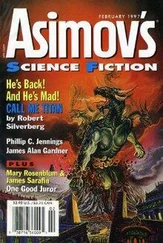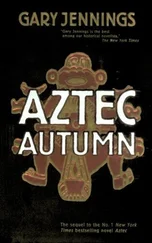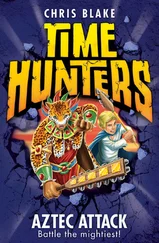Gary Jennings - Aztec
Здесь есть возможность читать онлайн «Gary Jennings - Aztec» весь текст электронной книги совершенно бесплатно (целиком полную версию без сокращений). В некоторых случаях можно слушать аудио, скачать через торрент в формате fb2 и присутствует краткое содержание. Жанр: Старинная литература, на английском языке. Описание произведения, (предисловие) а так же отзывы посетителей доступны на портале библиотеки ЛибКат.
- Название:Aztec
- Автор:
- Жанр:
- Год:неизвестен
- ISBN:нет данных
- Рейтинг книги:4 / 5. Голосов: 1
-
Избранное:Добавить в избранное
- Отзывы:
-
Ваша оценка:
- 80
- 1
- 2
- 3
- 4
- 5
Aztec: краткое содержание, описание и аннотация
Предлагаем к чтению аннотацию, описание, краткое содержание или предисловие (зависит от того, что написал сам автор книги «Aztec»). Если вы не нашли необходимую информацию о книге — напишите в комментариях, мы постараемся отыскать её.
"Anyone who reads, anyone who still lusts for adventure or that book you can't put down, will glory in Aztec."--Los Angeles Times
Aztec
Aztec
Aztec — читать онлайн бесплатно полную книгу (весь текст) целиком
Ниже представлен текст книги, разбитый по страницам. Система сохранения места последней прочитанной страницы, позволяет с удобством читать онлайн бесплатно книгу «Aztec», без необходимости каждый раз заново искать на чём Вы остановились. Поставьте закладку, и сможете в любой момент перейти на страницу, на которой закончили чтение.
Интервал:
Закладка:
Poyec and I thought about it, and the boy suggested, "You mean things like Teotihuacan? The Place Where the Gods Gathered?"
"A good example, young Poyectzin. That city is now a tumbled and deserted and weed-grown ruin, but it obviously was once a greater and more populous city than Tenochtítlan can ever hope to be."
I said, "We were taught, Lord Teacher, that it was built by the gods when they all assembled to decide to create the earth and its people and all living things...."
"Of course you were taught that. Any grand thing not done by the Mexíca must not be credited to any other mortal men." He snorted a plume of smoke from his nostrils. "Although Obsidian Snake blotted out the Mexíca's past history, he could not burn the libraries of our Texcóco and other cities. We do still have records telling what this valley was like long before the coming of the Aztéca-Mexíca. Obsidian Snake could not change all the history of The One World."
"And those unaltered histories," I asked, "—how far back do they go?"
"Not nearly far enough. We do not pretend to have accounts dating back to the Lord and Lady Pair. You know the legends. Those two were the very first inhabitants of this earth, and then all the other gods, and then a race of giants." Neltitica took a few meditative puffs at his poquietl. "That legend about the giants, you know, may be true. An old and weathered bone was dug up by a farmer and is still preserved in Texcóco—I have seen it—and the surgeons say it is most definitely a thighbone. And it is as long as I am tall."
Little Poyec laughed uneasily and said, "I should not care to meet the man whose thigh it was."
"Well," said the Lord Teacher, "gods and giants are things for the priests to ponder. My interest is the history of such men, especially the first men in this valley, the men who built such cities as Teotihuacan and Tolan. Because all we have, we inherited from them. All we know, we learned from them." He took a last puff of smoke and removed from the holder the burned-down stub of his picíetl reed. "We may never know why they disappeared, or when, though the fire-charred beams of their ruined buildings suggest that they were driven out by marauders. Probably the savage Chichimeca, the Dog People. We can read but little of the surviving wall paintings and carvings and picture writings, and none of those things tells even the name of that vanished people. But the things are so artfully executed that we respectfully refer to their makers as the Toltéca, the Master Artisans, and for sheaves of years we have been trying to equal their achievements."
"But," said Poyec, "if the Toltéca have been so long gone, I do not see how we could have learned from them."
"Because a few individuals would have survived, even when the mass of them, as a nation, disappeared. These would have been some survivors who took to the high crags or the deep forests. And those diehard Toltéca would have endured in hiding—even preserving some of their books of knowledge perhaps—hoping to hand on their culture through their children and children's children, as they intermarried with other tribes. Unfortunately, the only other peoples in this area at that time were utter primitives: the stolid Otomí, the frivolous Purémpecha, and of course the ever-present Dog People."
"Ayya," said young Poyec. "The Otomí have not yet learned even the art of writing. And the Chichimeca to this day still eat their own excrement."
"But even among barbarians there can be a handful of extraordinary specimens," said Neltitica. "We must assume that the Toltéca chose carefully their mates, and that their children and grandchildren did likewise, and thus at least a few superior bloodlines would have been maintained. It would have been a sacred family trust, to hand down from father to son what each remembered of the ancient Toltéca knowledge. Until finally, from the north, there began to come to this valley new peoples—also primitives, but capable of recognizing and appreciating and utilizing that hoard of knowledge. New peoples with the will to fan that long-guarded ember again to flame."
The Lord Teacher paused to fit a new reed into his holder. Many men smoked the poquietl because, they said, its fumes kept their brains clear and healthy. I took up the practice myself when I was older, and found it a great aid to cogitation. But Neltitica smoked more than any man I ever met, and that habit may have accounted for his exceptional wisdom and long life.
He went on, "The first comers from the north were the Culhua. Then the Acolhua, my own forebears and yours, Poyectzin. Then all the other lake settlers: the Tecpanéca, the Xochimilca, and so on. Then, as now, they called themselves by different names, and only the gods know where they originally came from, but all those migrants arrived here speaking one or another dialect of the Náhuatl language. And here in this lake basin, they began to learn, from the descendants of the vanished Toltéca, what remained of the Toltéca's ancient arts and crafts."
"It could not all have been done in a day," I said. "Or in a sheaf of years."
"No, and perhaps not in many sheaves of years," said Neltitica. "But when learning must be done largely from elusive scraps of information, and by trial and error, and by the imitation of relics—well, the more people engaged in sharing the learning, the faster it is accomplished by all. Fortunately, those Culhua and Acolhua and Tecpanéca and all the rest could communicate in a common language, and they all worked together. Meanwhile, they gradually ousted the lesser peoples from this region. The Purémpecha moved west, the Otomí and Chichimeca drifted north. The Náhuatl-speaking nations remained, and they grew in knowledge and ability at about the same pace. It was only after those peoples had attained some measure of civilization that they ceased to be mutually supportive and began to vie for ascendancy over each other. It was then that the still-primitive Aztéca arrived."
The Lord Teacher turned his eyes on me.
"The Aztéca, or Mexíca, settled into a society that was already well developed, but a society that was beginning to separate into rival fragments. And the Mexíca managed to survive until Coxcox of the Culhua condescended to appoint one of his nobles named Acamapichtli to be their own first Revered Speaker. Acamapichtli introduced them to the art of word knowing, then to all the other knowledge already salvaged and shared by the longer-settled nations. The Mexíca were avid to learn, and we know what use they made of that learning. They played off the other rival factions of these lands, one against another, shifting their allegiance from one to another, until finally they themselves had achieved military supremacy over all the rest."
Little Poyec of Texcóco gave me a look as if I had been to blame for my ancestors' aggressiveness, but Neltitica went on speaking with the dispassion of the detached historian:
"We know how the Mexíca have thrived and prospered since then. They have far surpassed, in wealth and influence, those other nations that once snubbed them as insignificant. Their Tenochtítlan is the richest and most opulent city built since the days of the Toltéca. Though there are countless languages spoken in The One World, the far-ranging Mexíca armies and traders and explorers have made our Náhuatl the second language of every people from the northern deserts to the southern jungles."
He must have seen the trace of a smug smile on my face, for the Lord Teacher concluded:
"Those accomplishments would, I think, be enough for the Mexíca to boast about, but they have insisted on even more self-glorification. They rewrote their history books, trying to persuade themselves and others that they have always been the foremost nation of this region. The Mexíca may delude themselves, and may deceive historians of generations to come. But I believe I have adequately demonstrated that the usurping Mexíca are not the great Toltéca reborn."
Читать дальшеИнтервал:
Закладка:
Похожие книги на «Aztec»
Представляем Вашему вниманию похожие книги на «Aztec» списком для выбора. Мы отобрали схожую по названию и смыслу литературу в надежде предоставить читателям больше вариантов отыскать новые, интересные, ещё непрочитанные произведения.
Обсуждение, отзывы о книге «Aztec» и просто собственные мнения читателей. Оставьте ваши комментарии, напишите, что Вы думаете о произведении, его смысле или главных героях. Укажите что конкретно понравилось, а что нет, и почему Вы так считаете.











